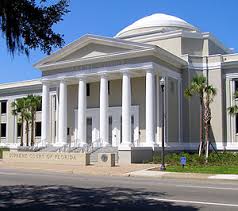 Florida Supreme Court Rules Secret Ex Parte Interviews of Medical Malpractice Plaintiffs’ Doctors Unconstitutional
Florida Supreme Court Rules Secret Ex Parte Interviews of Medical Malpractice Plaintiffs’ Doctors Unconstitutional
Florida Supreme Court Rules Secret Ex Parte Interviews of Medical Malpractice Plaintiffs’ Doctors Unconstitutional
On November 9, 2017, the Florida Supreme Court issued its highly anticipated decision in Weaver v. Myers, No. SC15-1538 (Nov. 9, 2017). In Weaver, the Supreme Court struck two provisions pertaining to secret, ex parte interviews with plaintiffs’ healthcare providers in connection with medical malpractice claims that were added to Sections 766.106 and 766.1065 of the Florida Statutes (“F.S.”) by amendments in 2013 (“2013 Amendments”). Id. at 49. First, the Court struck in its entirety F.S. § 766.1065(3)E, and second, the Court struck the last sentence from F.S. § 766.106(6)(b)5. Id.
Background
In order to file a medical malpractice suit in a Florida court, a claimant must first satisfy various statutory requirements that include a presuit investigation into the merits of the claim and disclosures to each prospective defendant containing a list of all healthcare providers seen within two years prior to the alleged negligence.
In connection with the mandatory disclosures, F.S. § 766.1065 requires that an “Authorization for Release of Protected Health Information” be executed, and the names and dates of treatment for all healthcare providers, regardless of whether they may potentially have information relevant to the claim, must be submitted to the defendants. Under the statutory scheme, the defendants and their representatives have the right to secret, ex parte interviews with any of the listed healthcare providers. That is, they may meet with the injured party’s healthcare providers without the injured party or legal counsel being present.
As part of the presuit investigation requirement, F.S. 766.106(6) provides for an informal discovery process in which the claimant must arrange interviews between a defendant or representative and the requested healthcare provider within 15 days of receiving notice and within 72 hours of receiving notice for subsequent interviews. If the claimant fails to make arrangements, the defendant is free to interview the healthcare provider without any further notice to the claimant or legal counsel, i.e., the interview may be conducted in secret.
The Florida Supreme Court observed that “a claimant now cannot institute a medical malpractice action without authorizing ex parte interviews between the claimant’s health care providers and the potential defendant.” Id. at 7.
The present case began when Emma Weaver (“Weaver”), individually and as personal representative of the estate of her late husband Thomas Weaver, filed a medical malpractice claim for wrongful death against Dr. Stephen Myers (“Myers”). Faced with the foregoing presuit notice and disclosure requirements, Weaver filed for declaratory judgment and injunctive relief, arguing that they, among other things, violate the right to privacy under the Florida Constitution.
The trial court rejected Weaver’s right to privacy challenge, concluding that an estate cannot assert any privacy rights on behalf of a decedent because any such rights absolutely terminate upon death and are thus retroactively destroyed. The First District Court of Appeal affirmed, ruling that any privacy rights are waived once that information is placed at issue by filing a medical malpractice claim. However, the Florida Supreme Court noted that the First District completely ignored the issue of privacy rights with respect to non-relevant medical information, which is the crux of the current case.
Florida Supreme Court Decision
On appeal before the Florida Supreme Court, there were three questions it had to resolve in reaching the issue of whether certain portions of the 2013 Amendments are unconstitutional.
- Do privacy rights that arise from the Florida Constitution absolutely terminate upon death and thus are retroactively destroyed?
- Does the personal representative of a decedent’s estate have standing to assert the decedent’s right to privacy under the Florida Constitution?
- Does mandatory disclosure of protected medical information that is neither relevant nor necessary to a medical malpractice claim violate the right to privacy under the Florida Constitution?
The Florida Supreme Court began its analysis by pointing out that unlike the U.S. Constitution the Florida Constitution explicitly provides a right to privacy in Article I, § 23. The Court explained “that the right to privacy in the Florida Constitution is broader, more fundamental, and more highly guarded than any federal counterpart….” Id. at 12. The Court added that it has unambiguously held that medical records are confidential based upon the right to privacy contained in the Florida Constitution.
Turning to the first question, the Supreme Court held that “[d]eath does not retroactively abolish the constitutional protections for privacy that existed at the moment of death.” Id. at 16. The Court instructed: “in all litigation contexts, a decedent does not retroactively lose and can maintain the constitutional right to privacy that may be invoked as a shield in all contexts, including but not limited to medical malpractice cases, against the unwanted disclosure of protected private matters, including medical information that is irrelevant to any underlying claim including but not limited to any medical malpractice claim.” Id.
After concluding that the decedent’s right to privacy under the Florida Constitution survived his death, the Supreme Court addressed the question of whether the personal representative of his estate has standing to assert those privacy rights. The Court held that Weaver, as personal representative of decedent’s estate and wife, “clearly has standing to challenge the provisions at issue by presenting the constitutional right to privacy” in the decedent’s protected medical information. Id. at 27.
The Court reasoned that since a decedent has a recognized constitutional right to privacy “then it most assuredly must be capable of being advanced.” Id. at 26. That is, if the personal representative did not have standing, then no one could assert the decedent’s constitutional rights. It observed that under Florida’s Wrongful Death Act the personal representative of a decedent’s estate is the only party who may file a decedent’s cause of action for wrongful death. Similarly, the personal representative must have the ability to assert a decedent’s privacy rights. According to the Court, “Weaver’s status as wife may further entitle her to assert the right.” Id. at 27.
Having determined that a decedent’s constitutional right to privacy survives death and that the personal representative is the proper party to assert that right, the Supreme Court turned its attention to the question of whether the decedent’s right to privacy is violated by being forced to comply with the presuit notice and disclosure requirements at issue. The Court held that “the constitutional right to privacy has been violated in this case.” Id. at 32-33.
The Court began its inquiry by reiterating the rule that any law that “implicates the fundamental right of privacy, regardless of activity, is subject to strict scrutiny and, therefore, presumptively unconstitutional.” Id. at 28 (quoting Gainesville Woman Care, LLC v. State, 210 So.3d 1243, 1245 (Fla. 2017). Myers and amici argued that the legislative intent behind the 2013 Amendments is sufficient to satisfy the strict scrutiny test. They asserted that (1) encouraging settlement by granting equal access to relevant information, resulting in inexpensive and quick resolution of claims, (2) weeding out frivolous claims, and (3) streamlining medical malpractice litigation are enough to justify the State intrusion on protected privacy interests.
The Supreme Court rejected the proffered justifications, stating that “none of these asserted interests, individually or collectively, are sufficiently compelling to outweigh the interest of a patient in keeping private medical information that was given in confidence to medical personnel under the protections of both federal and Florida law when that information is not relevant to the prospective claim of malpractice.” Id. at 29. Even assuming for the sake of argument that they were, the Court noted that mandating secret, ex parte interviews is not the least intrusive means of advancing those interests and thus would still fail the strict scrutiny test.
The Court remarked: “The ex parte secret interview provisions of sections 766.106 and 766.1065 fail to protect Florida citizens from even accidental disclosures of confidential medical information that falls outside the scope of the claim because there would be no one present on the claimant’s behalf to ensure that the potential defendant, his insurers, his attorneys, or his experts do not ask for disclosure of information from a former treating health care provider that is totally irrelevant to the claim.” Id. at 30. That is an inherent flaw in the presuit notice and disclosure requirements introduced by the 2013 Amendments.
The Supreme Court then pointed out that § 766.106(6)(b) provides for other informal discovery tools such as unsworn statements of the parties and treating healthcare providers (with claimant’s attorney present), written questions, production of documents, and physical and mental examinations. “There is nothing to indicate that these tools are deficient in the acquisition of information relevant to a potential medical malpractice claim, such that secret ex parte interviews” are justified, the Court reasoned. Id. at 32.
According to the Court, the 2013 Amendments at issue also run afoul of the Unconstitutional Conditions Doctrine, which “forbids burdening the Constitution’s enumerated rights by coercively withholding benefits from those who exercise them,” that has been recognized by the U.S. Supreme Court. Id. at 44 (quoting Koontz v. St. Johns River Water Mgmt. Dist., 133 S.Ct. 2586, 2595 (2013).
Invoking the Unconstitutional Conditions Doctrine, the Florida Supreme Court stated: “Having determined that the statutory amendments impermissibly intruded on the fundamental and explicit constitutional right to privacy by the statutory requirements, the amendments cannot accomplish that end by conditioning the exercise of another highly guarded constitutional right on such submission in light of the constitutional prohibition.” Id. at 43-44. “However, such unconstitutional conditioning and coercion is exactly what the amendments to section 766.106 and 766.1065 have done here,” the Court concluded. Id. at 44.
The Supreme Court announced: “Having determined that the 2013 amendments to section 766.106 and 766.1065 of the Florida Statutes are unconstitutional, we now must undertake considerations as to whether to sever the unconstitutional portions.” Id. at 48. The Court stated “[n]oting the limited nature of our holding today and our severance principles, we make two strikes from the amended statutes.” Id. at 49.
First, the Court struck in its entirety § 766.1065(3)E, Florida Statutes (2013). It states: “This authorization expressly allows the persons or class of persons listed in subsections D.2.-4. above to interview the health care providers listed in subsections B.1.1-2. above, without the presence of the Patient or the Patient’s attorney.” Id. Second, the Court struck the last sentence from § 766.1065(6)(b)5, Florida Statutes (2013), which states: “If claimant’s attorney fails to schedule an interview, the prospective defendant or his or her legal representative may attempt to conduct an interview without further notice to the claimant or the claimant’s legal representative.” Id.
The Florida Supreme Court quashed the First District’s decision and remanded for further proceedings consistent with its opinion.
Frequently Asked Questions

The increase in the number of breast augmentations performed has also led to an increase in the number of breast implant malpractice claims. When a patient is seriously injured or dies as a result of breast augmentation surgery, it is possible that malpractice has occurred. Potential Breast Implant Injuries There is always a risk involved
Read More
Responsible. Competent. Experienced. You think of physicians having all these qualities. You put your life in their hands. Yet, sometimes things go awry. When things go wrong and the actions of a medical professional harm you, he or she has failed to fulfill professional obligations to you. The doctor failed to perform his or her
Read More